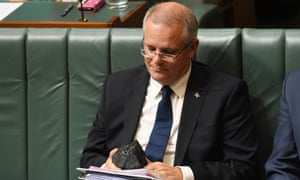Brown to Green report highlights Australia’s poor response on deforestation, transport, energy supply and carbon pricing
Australia’s response to climate change is one of the worst in the G20
with a lack of policy, reliance on fossil fuels and rising emissions
leaving the country exposed “economically, politically and
environmentally”, according to a new international report.
Australia’s progress to meeting its already “unambitious” Paris climate targets was third worst, fossil fuel energy was on the rise and policies to tackle high transport emissions and deforestation were also among the worst across the G20 countries.
The Brown to Green report, now in its fifth year, takes stock of the performance of G20 countries on climate change adaptation and mitigation across key sectors, and in the finance sector.
The chief executive of Climate Analytics, Bill Hare, an Australian co-author of the report, told Guardian Australia: “Australia is behind [on] climate action in nearly every dimension. Australia’s emissions are increasing and there’s virtually no policy in place to reduce them.”
Some 14 non-governmental groups, thinktanks and research institutes
compile the report, funded by the World Bank, the US-based ClimateWorks
Foundation and Germany’s environment ministry.Australia’s progress to meeting its already “unambitious” Paris climate targets was third worst, fossil fuel energy was on the rise and policies to tackle high transport emissions and deforestation were also among the worst across the G20 countries.
The Brown to Green report, now in its fifth year, takes stock of the performance of G20 countries on climate change adaptation and mitigation across key sectors, and in the finance sector.
The chief executive of Climate Analytics, Bill Hare, an Australian co-author of the report, told Guardian Australia: “Australia is behind [on] climate action in nearly every dimension. Australia’s emissions are increasing and there’s virtually no policy in place to reduce them.”
Across the G20, the report said, limiting global heating to 1.5C would cut negative impacts by 70%, compared with allowing global temperatures to rise by 3C. Currently, extreme weather events were costing G20 countries about US$142bn annually.
While the report doesn’t provide an overall ranking, Australia appears consistently among the worst performers in the report’s analysis.
India and Australia were the only two G20 countries that had not introduced, or were not considering, policies to price greenhouse gas emissions, the report said.
Only South Korea and Canada were further away than Australia from meeting the pledges that formed their Paris climate commitments.
On deforestation, the report said Australia was the only developed country that was a “deforestation hotspot”, but had no policies to tackle it.
Australia was ranked third worst for transport emissions per capita, and the report found “Australia, in particular, lacking significant policy” in the transport sector. Per capita emissions from aviation were 53 times higher than India’s.
Australia, along with Russia, had no policies to move away from petrol-powered cars, no policies to decarbonise the heavy-duty vehicle sector and no policies to shift people onto public transport, the report said.
Australia, along with the US and Saudi Arabia, had high emissions from the building sector. Australia had no building codes covering renovation of older buildings.
All this lack of action, Hare said, was leaving Australia and its people exposed on climate change “economically, politically and environmentally”.
Hare told Guardian Australia: “The leadership of the country is effectively telling lies about their performance, and contradicting their own government’s information.
“The country is led by politicians who in one way or another deny either the science or are de facto denying it, and actively and wilfully opposing or obstructing climate policies.”
Referring to the current Liberal-led Coalition government, Hare said this was the same political party that had repealed climate legislation, such as the carbon pricing mechanism, and “since then has done all it can to undermine any level of action”.
He said the country’s position was in contrast with its opportunities in renewable energy, which it had not exploited as fully as it could.
“Australia has one of the best solar energy potential and wind potential in general of any of the G20 countries,” he said.
“Australia is not transforming its energy system and is focused on building coal and gas, and has not paid any attention to the need to transition to a zero-carbon economy.”

No comments:
Post a Comment